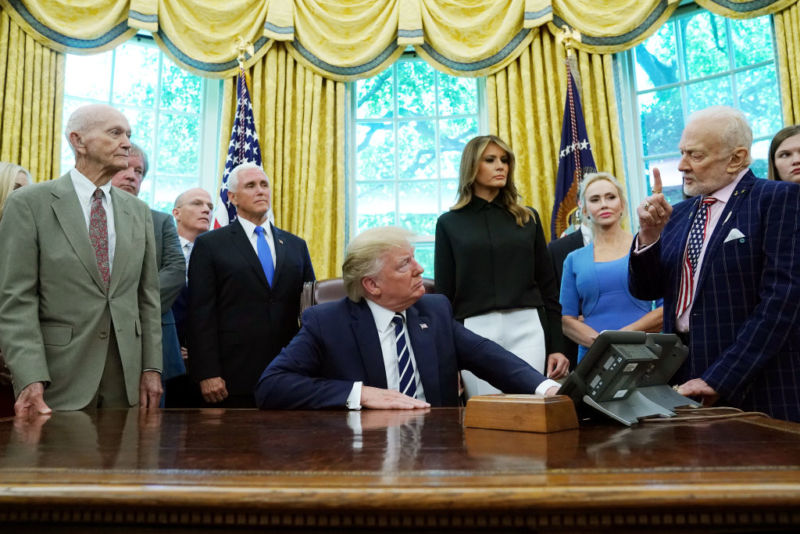
On Friday, a day before the 50th anniversary of the Apollo 11 Moon landing, President Trump invited the crew of that mission to the Oval Office. Seated, Trump was flanked by Lunar Module Pilot Buzz Aldrin, Command Module Pilot Michael Collins, and the children of Commander Neil Armstrong.
During the 20-minute ceremony, Trump praised the efforts of the Apollo 11 crew and NASA in achieving the first Moon landing half a century ago. But pretty quickly, he pivoted to his own administration's plans for sending humans to the Moon—and eventually Mars. The administration's Artemis Program, which calls for humans to return to the Moon by 2024, has been heavily promoted by the space agency as of late.
However, Trump seems much more interested in sending humans to Mars, which he considers more inspirational than a trip back to the Moon.
"To get to Mars you have to land on the Moon, they say," Trump said. Then the president turned to his right, asking a question of his administrator, Jim Bridenstine. "Any way of going there directly without landing on the Moon? Is that a possibility?"
Off to one side, Bridenstine—a strong lunar advocate whom Trump appointed to the post—gamely replied that it made the most sense to go to the Moon first. "Well, we need to use the Moon as a proving ground," Bridenstine said. "Because when we go to Mars, we’re going to have to be there for a long period of time. So we need to live and work on another world."
Asking Collins and Aldrin
But Trump did not give up, asking Collins what he thought the agency should be doing. Collins replied, as he has in multiple interviews, that he thinks "Mars direct" is a better way to go. Such a plan would bypass the Moon, and that strategy contradicts this administration's space policy that Trump himself signed in late 2017. Aldrin also is interested in going to Mars.
"Who knows better than these people?" Trump said of Aldrin and Collins. "They’ve been doing this stuff for a long time. What about the concept of Mars direct?"
Again, Bridenstine tried to explain why NASA had opted for a Moon-first strategy. "So the challenge is, if we go direct to Mars, there’s going to be a lot of things that we haven’t yet proven out," he said. "We need to use the resources of another world in order to live and work for long periods of time."
Trump and Collins then spoke a bit about how they really liked the concept of reusable rockets—Trump has previously said he was impressed by the Falcon Heavy rocket's boosters landing side-by-side in Florida. "That was unthinkable a long time ago?" Trump asked Collins.
"Yes sir," Collins replied. "It was one shot and they fell into the ocean, a tremendous waste of five good rocket motors for every Saturn V that you sent up. I think that is the most dramatic new idea, reusability. I mean how many things in our life do we use once and then throw it away?"
(It seems that no one has told Trump that NASA has decided not to pursue reusability. Like the Saturn V rocket, the first stage of the agency's Space Launch System will fall into the ocean, taking four expensive and reusable space shuttle main engines with it.)
Toward the end of the ceremony, Trump invited Aldrin to make a few comments about NASA's space policy, and Aldrin took this moment to criticize the Space Launch System rocket and Orion spacecraft, which combined do not have enough delta-v capability to get into low-lunar orbit and back. "Frankly, I’ve been a little disappointed in the last 10 or 15 years," Aldrin said. "Now we have the number-one rocket in the US and the number-one spacecraft, and they cannot get into lunar orbit with significant maneuvering capability. That’s a great disappointment to me." Aldrin elaborated on these concerns, and his preferred alternative plans, over the course of several interviews last month with Ars.
Again, Bridenstine was called upon to explain this. The administrator acknowledged this limitation of the agency's rocket and spacecraft, and he said that is why NASA is also constructing a small space station, called the Lunar Gateway, as a crutch of sorts to help get astronauts down to the lunar surface.
"I’d like to have you also listen to the other side because some people would like to do it a different way," Trump said. He then asked Bridenstine for his assurance that he would, in fact, listen to Aldrin's views. "So you’ll listen to Buzz and some of the other people, because they also feel, I know this has been going on for a little while, and we’re so advanced, but I would like to hear the other side. Alright?"
reader comments
252